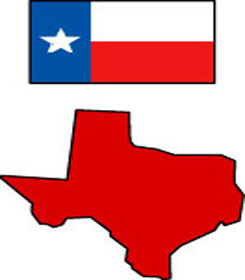
- Capital City:
- Austin
- Nickname:
- Lone Star State
- Motto:
- Friendship
- Statehood:
- December 29, 1845 (28th)
- Origin of State's Name:
- Based on a word used by Caddo Indians meaning "friends"
- Largest Cities:
- Houston, San Antonio, Dallas, El Paso, Austin
- Border States:
- Arkansas, Louisiana, New Mexico, Oklahoma
- Land Area:
- 261,914 sq. mi.; 2nd largest
- State Bird:
- Mockingbird
- State Flower:
- Bluebonnet (lupinus)
- State Tree:
- Pecan (carya illinoensis)
- State Song:
- Texas, Our Texas
The Republic of Texas achieved its independence from Mexico in 1836, the same year as the famous siege of the Alamo in which pioneers Jim Bowie and Davy Crockett were slain. The "Lone Star State" was the 28th state to join the Union, admitted in 1845. The name Texas is a Spanish name, which comes from an Indian word meaning "friends" or "allies." Texas is the second-largest state in the Union in area, after Alaska. Although it has a wild, frontier history, today Texas is a major producer of oil and has important centers of industry and finance. A Texas state historian has said that the state flower, the bluebonnet, "is to Texas what the shamrock is to Ireland."
Texas Rose Festival
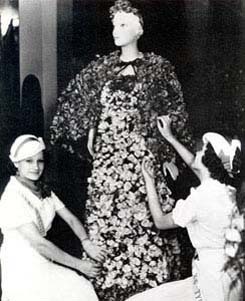
Have you ever heard the expressions "Smelling like a rose" and "Everything's coming up roses?" They mean that something good has happened, because roses are so beautiful and smell so good. Have you ever smelled a rose? They are fragrant, colorful flowers with thorny stems and exist in many varieties.
Texas is known for its roses. Since 1933, the Texas Rose Festival in Tyler has celebrated the beauty and scent of roses. Inspired by a new agricultural industry, civic-minded leaders and the women of the Tyler Garden Club created the Texas Rose Festival to promote the rose industry, build tourism, celebrate volunteerism, and instill community pride. The four-day festival offers a Queen's Coronation, a Rose Show, a Queen's Tea, and a Rose Parade.
After a plague wiped out the area's peach crops, rose growing in Tyler began on a small scale in the early 1900s. Rose plantings increased each year, and business boomed.
Tyler roses are famous. In 1968, Tyler "Apache Belle" roses were given to Lady Bird Johnson, wife of President Lyndon B. Johnson, and they now grow in the White House Rose Garden.
Athens Fiddlers Contest and Reunion
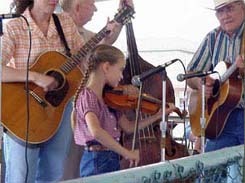
Have you ever seen a fiddle? A fiddle is an early version of the violin -- it is a medieval European instrument with a neck, a rounded shape and three to five strings with tuning pegs on the front or back to tighten or loosen the strings. The girl in the photo is only 8 years old, but she plays the fiddle well enough to be in the Athens, Texas, Fiddlers Contest and Reunion.
The people of east Texas love a good fiddle tune. That's why so many of them gather every year for this event. The reunion is a chance for fiddling friends to catch up with each other, and the contest is a chance for fiddlers to show their stuff. Contestants range in age from 8 to 80. They are judged on their style and skill, and, most important, on how closely they re-create old-time fiddle music -- the music that gave courage to starving troops of soldiers at Valley Forge during the American Revolution, earned devoted admirers like Benjamin Franklin and Thomas Jefferson, and today continues to delight millions.
Sam Houston and the Battle for Texas Independence
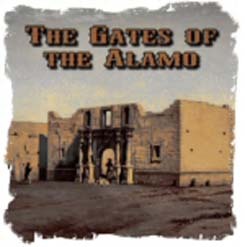
"Remember the Alamo" is a well-known phrase. Do you know what it means?
Sam Houston had already served in the U.S. House of Representatives and as governor of Tennessee when he moved to Texas in 1832. At the time he arrived, Texas was part of Mexico and the site of rising tensions and violent disturbances between Mexican authorities and Anglo settlers from the United States. Voicing his support for a separate state of Texas, Houston emerged as a leader among the settlers. In 1835, he was chosen commander in chief of the Texas army.
The Alamo was an 18th century Franciscan Mission in San Antonio, Texas, which was the location of an important battle for Texans fighting for independence from Mexico. In 1836, a small group of Texans was defeated by Mexican General Santa Anna.
When Houston received word of the defeat at the Alamo, he was inspired to begin a month-long retreat to regroup and replenish the Texas army's strength. Remembering how badly the Texans had been defeated at the Alamo, on April 21, 1836, Houston's army won a quick battle against the Mexican forces at San Jacinto and gained independence for Texas. Soon after, Houston was elected president of the Republic of Texas. He continued to serve as senator and governor after Texas became part of the United States in 1845.
Sam Houston died in 1863 in Huntsville, Texas, where a 67-foot-tall memorial statue of him now stands. After a lifetime of service to his country, the event for which he is most well known is his role in the independence of Texas.
Buccaneer Days in Corpus Christi
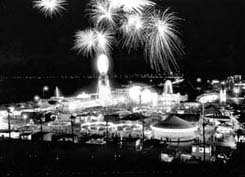
Every year the city of Corpus Christi, Texas, is captured by dangerous pirates!
But these pirates are actually hired by the city to help celebrate Buccaneer Days -- the opening days of the summer beach season in Corpus Christi. Buccaneers are pirates who used to sail in the Gulf and attack Spanish ships, other merchants and settlements in the area during the 1600s. Today, the Buccaneers sail in, capture the mayor and force him to walk the plank as he announces the arrival of Buccaneer Days!
Held for over 60 years, Buccaneer Days now draws more than 1.2 million people to its 24-day celebration. Fun-filled days of rodeos, races, rides, and carnival games help raise funds to finance scholarships and many other civic programs. In addition, a national orchestral music festival brings the participation of more than 6,000 children.
Osceola in Florida
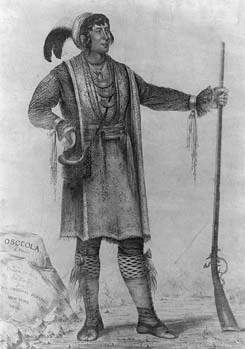
The story of Osceola, a Seminole Indian, may not be well known, but his brave attempts to remain in Florida and fight the U.S. government are well documented. Osceola was one of the leaders of the Seminole Indians during the Second Seminole War with the United States in the 1830s. Although originally from Alabama, Osceola and his Creek Indian mother moved to Florida, which was the homeland of the Seminole Indians. When white settlers began moving into the state, they wanted the Seminoles to move to Indian territories west of the Mississippi River. Osceola led a group of Seminoles opposed to relocation. Other Seminoles, however, chose to move rather than fight.
By using tactics unfamiliar to the white settlers and by hiding in the Everglades, Osceola and some of the Seminoles were successfully able to resist the United States government's attempts to remove them from Florida for a time. It was not until the capture of Osceola and his death in 1838 at Fort Moultrie in South Carolina that the Seminoles were forced from their homeland.
 Print
Print Email
Email







